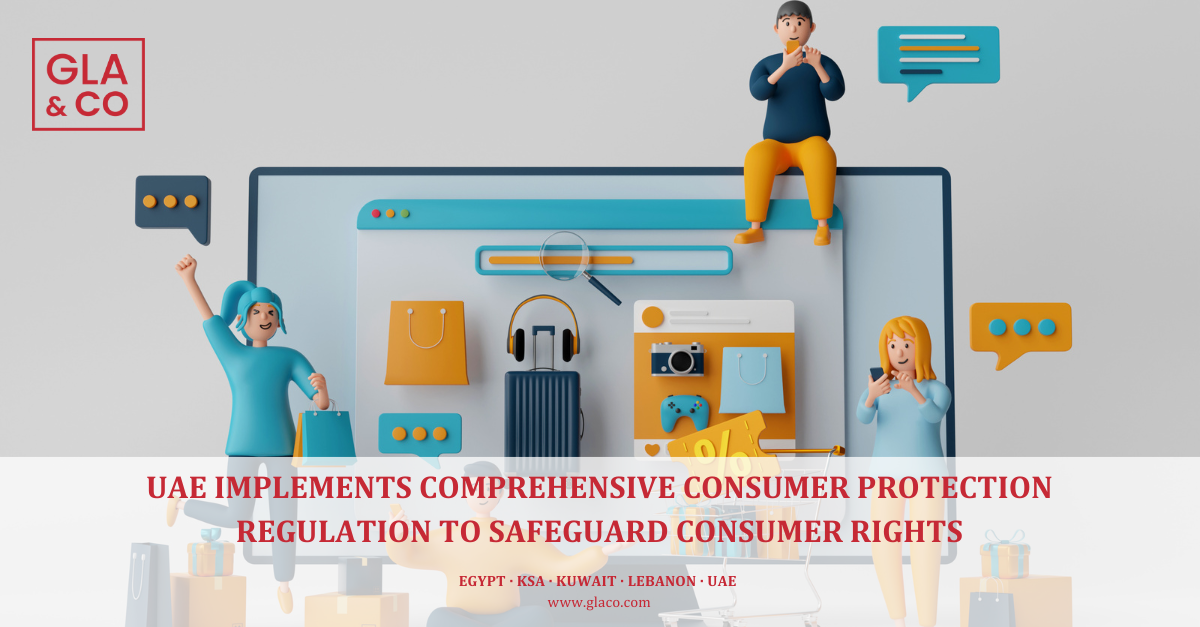
UAE Implements Comprehensive Consumer Protection Regulation to Safeguard Consumer Rights
Introduction
In a significant move towards strengthening consumer rights and promoting fair trade practices, the United Arab Emirates (“UAE”) has introduced a new consumer protection regulation; Executive Regulations No. 66 of 2023 (the “Regulation”). The Regulation underscores the UAE’s commitment to fostering transparency, accountability of businesses, and consumer well-being in the marketplace. The Regulation, further, marks an important leap forward for consumer protection within the UAE. This follows suit with the release of UAE’s regulations for protection for consumers of Financial and Insurance Institutions. Simultaneous to the issuance and implementation of the new e-commerce law, this Regulation would establish a robust framework that safeguards consumer rights, guarantees the quality and safety of goods and services, and sets a benchmark for ethical business behaviour.
Key takeaways:
Advertising and Promotions
This Regulation provides clear guidelines for suppliers and has bolstered their obligations with regard to advertising and promotions. In this respect, the Regulation has a great emphasis on:
- Transparent Pricing: Obligating suppliers to clearly declare the prices of goods;
- Preventing Misleading Advertisements: Advertisements are prohibited from containing misleading information that is intended to trick consumers regarding the nature of the product; and
- Providing Crucial Information to Customers: Suppliers are obligated to notify consumers of any promotional discounts if the date fixed for the promotion is within one week from the date of purchase.
Harmful Contractual Clauses
The Regulation specifically addresses harmful clauses in contracts, invoices, and other documents. Provisions that could be considered detrimental to consumers are prohibited. This includes conditions that grant suppliers unfair unilateral powers over consumers or restrict consumer rights.
This is important when it comes to consumers accepting terms and conditions when purchasing items as most of the time consumers do not get an option to reject or negotiate these terms. Harmful clauses would also include any discrimination between consumers. All types of anti-competitive practices including regulation of supply and manipulation of prices is prohibited, along with any implied or express agreements which would affect competition.
Labelling and Invoicing
The Regulation sets clear standards for labelling and invoicing, covering information requirements on goods packaging and emergency actions against abnormal price increases. The prices of the goods must be clearly stated on the item and whether or not discount cards are accepted.
Labelling must include all essential information outlined in the Regulations. Additionally, used, refurbished, and damaged goods must adhere to specific standards, including being labelled as such in consumer transactions. Labelling must also be written in Arabic.
Warranties and Spare Parts
Suppliers are now mandated to disclose warranty details, spare part mechanisms, and maintenance documentation in Arabic on their website or somewhere else easily accessible. Warranties that are advertised have to be evidenced with written proof of warranty to be provided to the consumer. Customers should have access to guidance for assembling and disassembling products, along with a convenient method to procure spare parts.
A company shall provide spare parts to a customer in no more than 7 days for a regular part and 14 for a less common part. Warranties on goods and services shall provide consumers should be able to choose either a complete or partial refund or a re-performance from the service provider. The Regulation also outlines specific procedures for handling defective goods, emphasizing immediate consumer notification, halting trade, and efficient recall processes.
Defective Goods
Upon discovering a defect in a product that compromises its efficiency, and effectiveness, or poses a safety risk, the provider is obligated to follow specific procedures. These procedures include ceasing the trade of the defective product or provision of the service, withdrawing the product from the market, and taking corrective actions such as recovering, replacing, or repairing the defective goods at the provider’s expense, or offering a full refund to the consumer.
Importantly, the Regulation prohibits the resale or display of withdrawn or returned goods on electronic sales platforms. The company must notify the concerned authority and the public when a defect is discovered. The concerned authority has the authority to determine the timing and means of these announcements.
E-commerce Regulations
The Regulation introduces comprehensive obligations on e-commerce providers, emphasizing detailed commodity information disclosure, responsibility for third-party offerings, and adherence to the Arabic language requirement.
From harmful conditions to misleading advertisements, businesses in the e-commerce sector must align with the Regulation to ensure consumer protection. E-commerce suppliers are now required to provide consumers with detailed information about the nature, specifications, and terms of handling and risks of each commodity.
Penalties
Civil and criminal penalties, administrative sanctions, and fines are applicable for non-compliance, emphasizing the seriousness of adherence to the Regulations. Maximum penalties include fines of up to AED 2,000,000 and/or imprisonment for two years.
Conclusion
In summary, the UAE’s step in enacting the Consumer Protection Law captured in Executive Regulation No. 66 of 2023, signifies a profound commitment to consumer rights, fair trade, and ethical business practices. This milestone solidifies the UAE’s position as an actor in prioritizing consumer welfare and fostering a marketplace marked by transparency and integrity. In effect, this legislation is aligned with UAE’s steps to refine its economic landscape, cultivate consumer confidence, and propel ethical conduct within business transactions.
How can we help?
Our GLA team is delighted to assist the companies to understand these new regulations and update their internal and external policies to remain in compliance with the new regulations. Employees should be well-trained in these new regulations to maintain compliance.
Authors: Yousef Al Amly, Partner and Jehan Saleh, Associate.
Feel free to reach out to our Managing Partner Alex Saleh at alex.saleh@glaco.com and Partner, Yousef Alamly at y.alamly@glaco.com

